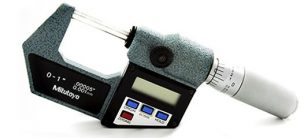This is a quick video tutorial on Metrology and Calibration. If you would like to read the tutorial in detail, scroll down for the full article.
Metrology

Metrology is a science of measurement.
Based upon the field of application it can be further divided into
- Industrial metrology
- Scientific or Fundamental metrology
- Legal metrology
Metrology in engineering deals with the Measurement of length and mass and time and the remaining will be derived from these quantities. To measure such quantity there must be a unit of measurement. this will enable the quantity to be measured in number in that particular unit system.
Whereas scientific or fundamental metrology deals with the Organization and development of measurement standards and their maintenance.
Whereas Legal metrology is primarily concerned with Accuracy. Also concerns with the unit of measurements, methods of measurement and measuring instrument.
Calibration
It is traceability of measurement. Simply the act of comparison against the standards.
Calibration will ensure that the instrument used for testing gets accurate results and it’s performing to its specification.
There are two principles involved in Calibration.
- Traceability
- Uncertainty
Uncertainty will estimate the error associated with the calibration measurement. The smaller the uncertainty the higher the accuracy of the calibration measurement. Whereas traceability describes How the calibration results can be traced back through a chain of calibrations to national calibration standards.
Let us know in the comment section below if we can add anything to this article.


It got my attention when you said that the measurement of length and mass and time is what metrology in engineering is all about. This made me think of measuring instruments and testing procedures where accurate measurements are critical. I could imagine how a metrology laboratory service could benefit a lot of industries.